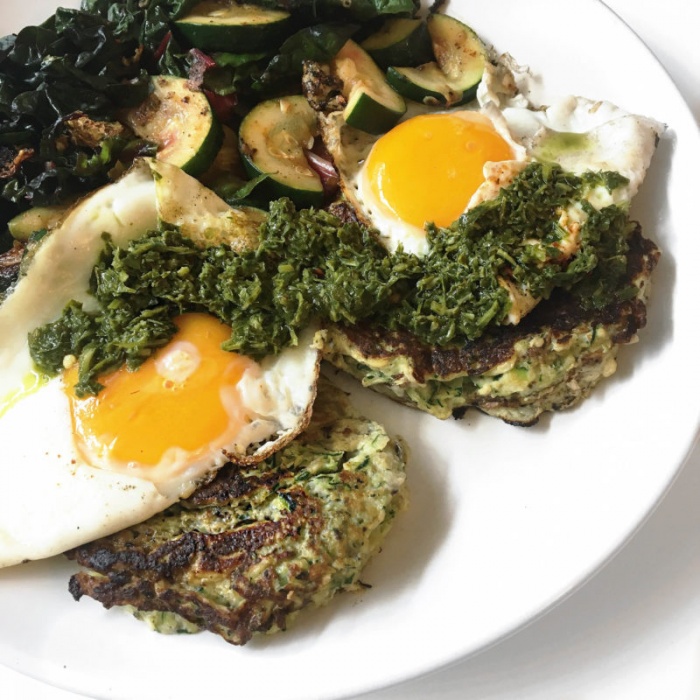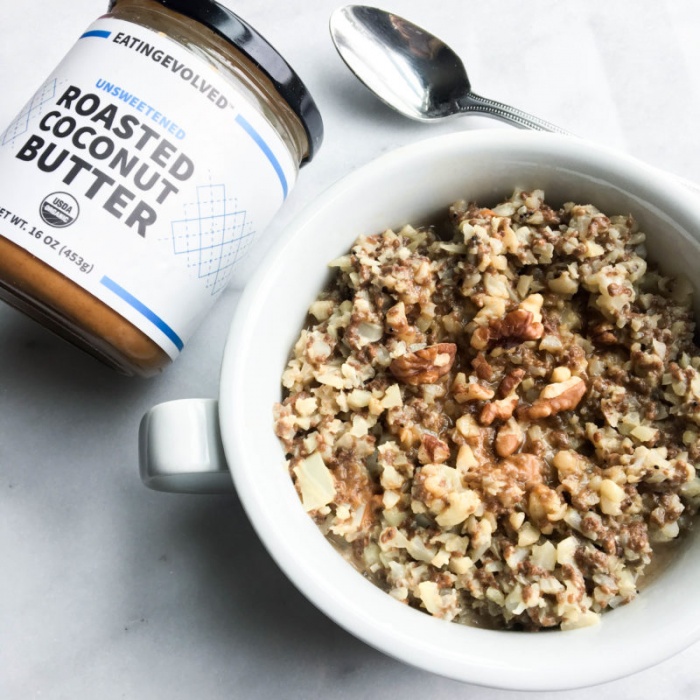This week is Mind Body Green‘s No Sugar Week, and it has caused a lot of controversy on Instagram. I’ve been biting my tongue all week, but that didn’t last long. I really want to share my thoughts on the topic because I have been genuinely confused and frustrated because of people’s reactions.
When I first heard about MBG’s No Sugar Week, I really didn’t think twice about it. People go on sugar detoxes all the time! Whole 30s are huge. Mark Hyman’s 10 day sugar detox is huge. Diane Sanfilippo’s 21 day sugar detox is huge. There are so many sugar detoxes everywhere… so MBG’s didn’t really feel out of the ordinary.
Suddenly, though, I saw negative responses popping up all over social media. People were really upset over MBG’s No Sugar Week. Like, extra upset. The first day, I was extremely confused by this because of all of the other popular sugar detoxes that have been around for some time, as previously mentioned. Why was this one in particular causing so many complaints? I felt like I was missing something, so I obviously tried to figure it out.
After watching a number of people talk about their problems with MBG’s No Sugar Week, I had a better understanding of their points of view. However, I am still confused about why this no-sugar-week has caused such an uproar while so many others receive minimal attention. It seems very random. Kind of like the attention toward that silly article saying that coconut oil is unhealthy for you. The American Heart Association has been spreading lies for years and putting out ridiculous articles for quite some time. Why did that one get so much attention? I can assure you, coconut oil is healthy. Don’t worry about it. Moving on.
All I can conclude is that this No Sugar Week made people upset because Mind Body Green is hosting it, and MBG gets a ton of publicity and is one media outlet that the entire health and wellness community pays a lot of attention to, no matter what your dietary philosophy is. I’m going to assume that’s what made this one stand out.
Now, let’s discuss the arguments against No Sugar Week. In short, a lot of people were saying that they don’t agree with limiting fruit consumption. That natural sugars shouldn’t be limited. Some have claimed that we need fruit in our diets in order to be healthy. Some people were saying that No Sugar Week might trigger eating disorders and food fears. That this is promoting dieting, and shaming people for the food they eat.
To be clear, let’s talk about the guidelines of No Sugar Week. It’s very simple. MBG says that for one week, anyone participating pledges not to consume any added sugar of any kind (maple syrup, honey, coconut sugar), but sugar from fruits is okay in limited quantities.
One.
Week.
One week, guys. It’s not a lifetime! I have never heard anyone shame Whole 30 the way they have shamed MBG’s No Sugar Week, and 30 days is much longer than 7 days.
The other thing is, MBG is not forcing anyone to do anything. Like any other sugar detox / diet reset, this is completely optional. Basically, if someone wants to do it, this offers a way for them to try out reducing their sugar consumption with the support of a community, a hashtag to find recipe inspo, and other support methods. If someone doesn’t want to do it, then they certainly don’t have to.
I want to go back to what I said before. I have never heard anyone shame Whole 30 the way they have shamed MBG’s No Sugar Week.
That is what a lot of these arguments have come down to. Shaming. I hate to say it, but it’s how I feel. I am not personally participating in MBG’s No Sugar Week, but I am on a no-sugar diet to heal my gut right now, so I take the attacks personally. I also know from working with clients, and from personal experience, how much sugar consumption can affect someone’s health and well-being, and I can’t help but think how the hate on NSW is making all of those people feel.
People are arguing that NSW (No Sugar Week) is shaming people who eat sugar, but all of the responses to NSW are shaming the people who are choosing not to eat sugar for a week.
I don’t think that’s cool.
People have the right to consume or not consume any foods they want. We all have the right to OUR OWN bodies. More than that, though, how can you shame someone for doing something that can jumpstart them into healing their bodies?
This cuts to a deeper issue of health shaming that I have seen too often on the Internet recently. Orthorexia is on the rise, and it is dangerous when someone’s lifestyle becomes “too healthy” and leads them into disordered eating. There is no such thing as a perfect diet, and it is certainly dangerous when someone is trying to achieve a “perfectly clean” diet.
However, eating healthy should not be shamed. In response to the rise of orthorexia, a lot of people have started to shame generally healthy eaters. People are using orthorexia and other eating disorders as an excuse to make people feel bad about choosing foods low in sugar, for example, over cookies and brownies. In other words, the pendulum sometimes swings too far the other way. No one is ever satisfied. There are people who are making others feel bad if they don’t eat a cookie and ice cream every night after dinner, and that’s not fair either. There are people on the Internet who are making others feel like they have to prove they aren’t “afraid” of certain foods, and that if they don’t, they’re somehow less than or disordered.
There is a fine line between stepping in when someone’s behaviors are truly disordered and dangerous, and unfairly judging someone for eating what makes them feel their best. It’s difficult because the difference is somewhat subjective. Having struggled with orthorexia, I understand the line from personal experience. There is a difference between not eating a food because you are afraid of it and not eating a food because you know it doesn’t support your health or makes you physically feel like garbage. Someone might think that not wanting to eat dessert is disordered eating, but I think it very much depends on the situation. It’s not so black and white. Maybe someone who doesn’t want dessert is struggling with disordered eating, but there’s a good chance they’re also not. Maybe they just don’t want dessert.
The line is fuzzy. Unless you’re giving diagnoses, it’s probably not fair to make that serious judgment so “officially” toward such a broad spectrum of people. I think that being aware of health shaming is very important. No one should ever feel guilty for wanting to be healthy.
For a moment, I want to represent the girl who has a history of an eating disorder but also cares a lot about her health. I have a history of orthorexia, but I also have struggled with a lot of digestive issues amongst a number of other complicated health problems, and my diet is a key part in allowing me to feel good enough to walk around and not be in physical pain all day long.
One of the biggest issues I have with the way eating disorder treatment is commonly carried out in today’s world is that girls are often shamed into feeling like they are not allowed to be health-conscious. I completely disagree with that sentiment, and I feel like it can be very detrimental to someone’s recovery, even causing them to rebound into another eating disorder.
You are allowed to recover from an eating disorder and still eat healthy food. You do not have to binge on dessert to be recovered. Eating dessert does not “prove” recovery. If you want dessert, EAT IT. If you don’t, DON’T. Nourishing your body is what is important, and that is what is different for everyone. Sometimes I want to nourish my body with avocados and nuts and lots of veggies and turmeric-coated salmon. I’m not a bad person for that. Other times I want to nourish my body, in a different way, with a huge ice cream cookie sandwich. I’m not a bad person for that, either.
There are millions of people, including myself, who struggle with health issues, especially digestive issues. Sugar is a large contributing factor to many of those health problems. Sugar has been linked to almost every disease. At this point, I think everyone knows that excessive consumption of processed sugars does nothing but harm our brains and bodies. Beyond processed sugars, though, many people react to “natural sugars” as well. Insulin resistance is extremely prevalent in our society, and following a lower carbohydrate diet can be crucial in managing it. What about carbohydrate intolerance or fructose intolerance? What about general food intolerances? What about diabetes and other instances of blood sugar disregulation? Beyond that, what about gut issues? Candida overgrowth is overwhelmingly common in this nation. There’s SIBO, endometriosis, parasites, Crohn’s, and a million other infections and diseases, autoimmune and not, that require low-sugar diets for periods of time, if not long-term.
As someone who has been diagnosed with insulin resistance, carbohydrate intolerance, SIBO, Candida overgrowth, and a number of other health issues in the past that have required specialized “diets” for treatment, it frustrates me to see people shame others when they remove sugars from their diet for any period of time, let alone a week. It is completely ridiculous for anyone to make others feel like a bad person for doing something to help heal their bodies. If they really want to take it up with someone, they can take it up with a functional medicine doctor. But really, they should just focus on themselves.
Even if the naysayers are not trying to address these “special cases,” sadly, most people are one of those “special cases” in today’s world. The truth is, when you look at our general population, almost everyone is either a) consuming a lot of sugar on a daily basis without realizing it or b) struggling with digestive distress. In both of those situations, I see a weeklong sugar detox as a way test out healing their bodies. It might open their eyes to what they’re really eating every day. One week of no sugar is not going to heal anyone, but it could open their eyes to how much better they might feel if they nourished their bodies in other ways. And no one should be shamed for that. I think a lot of people might be forgetting the wide population that a media outlet like Mind Body Green reaches. You get the health junkies, yes, but you also get the people who eat the Standard American Diet and don’t get off the couch for days on end but are curious about making a lifestyle change.
In response to people who are saying fruit is necessary for survival – this is absolutely false. Fruit is not necessary in our diets. Does that mean we have to be afraid of it or avoid it? No. But let’s not spread rumors to make people scared to NOT eat fruit, either. A lot of people’s bodies don’t do well with fruit. The other side of the pendulum… again. Also, MBG isn’t saying that people aren’t allowed to eat fruit. They just suggest limiting the quantity. So let’s not get ahead of ourselves and get upset with people for replacing 10 bananas a day with one if they so desire. I think it is a very far reach to conclude that the suggestion to eat a little less fruit for 7 days is causing eating disorders. If you’re going to make a claim like that, then pretty much every piece of health information put out on the Internet should be accused of causing eating disorders.
At the end of the day, it saddens me that something as simple as a sugar detox has set off such an uproar. This sugar detox was meant to help people, but it has been turned into something else. Doing a no-sugar week does not mean someone has an eating disorder. If someone is using this type of challenge to justify their eating disorder behaviors, that is a different story and should certainly be addressed. However, that doesn’t mean the rest of the population should be condemned for trying to improve their health. If you had an eating disorder, you are allowed to enjoy healthy eating, and you do not have to consume any particular amount of sugar. If you have a health issue, you are allowed and encouraged to do whatever you need to do to feel your best, which might require a healing diet. Because food can heal. It can harm, but it can heal.
The health shaming isn’t fair to anyone. I think we all need to take a step back and allow people to participate in whatever program they want to participate in. If someone wants to cut sugars out of their diet for a week, let them. It doesn’t affect you. If someone doesn’t want to cut sugars out of their diet for a week, let them. It still doesn’t affect you. You shouldn’t be afraid of sugar. But you also shouldn’t be afraid to not have sugar at risk of upsetting others who, for some reason, think you need to “prove” to them that you’re not afraid of it.
In sum, do what works for your body. Support people for trying to make the best decisions for their health. If you disagree with what someone is doing, do it in a loving, caring, and educated way, rather than in an accusing and attacking manner.
You do you.











Get Updates
And Goodies
We’re over fake “wellness.” It’s time to unlock your magic & magnetism. Are you ready to vibe higher?
Are you ready to finally optimize your health habits for real results and true health?